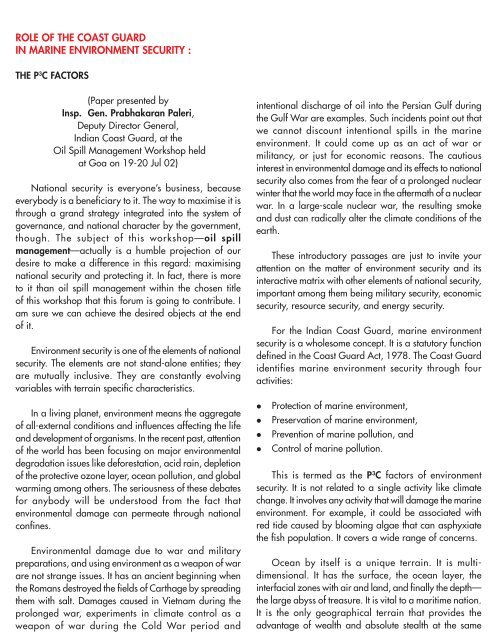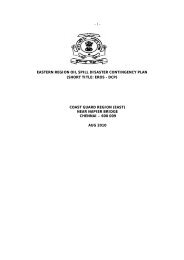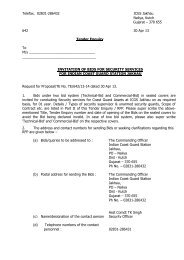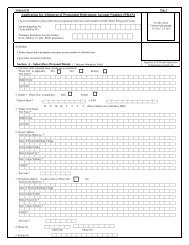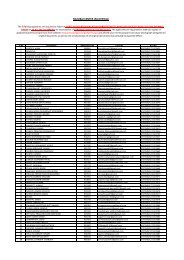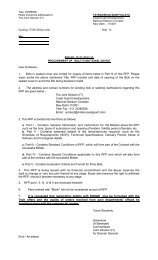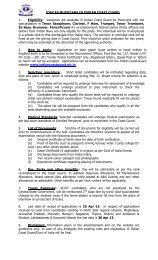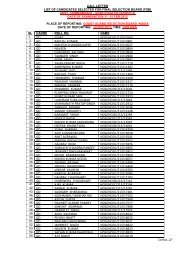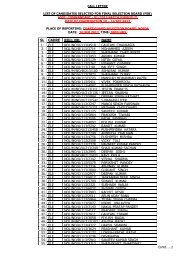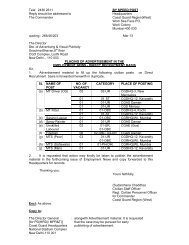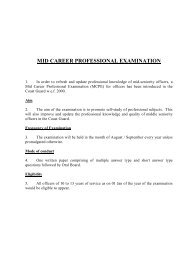editorial-FOR PRINT.pmd - Indian Coast Guard
editorial-FOR PRINT.pmd - Indian Coast Guard
editorial-FOR PRINT.pmd - Indian Coast Guard
You also want an ePaper? Increase the reach of your titles
YUMPU automatically turns print PDFs into web optimized ePapers that Google loves.
ROLE OF THE COAST GUARD<br />
IN MARINE ENVIRONMENT SECURITY :<br />
THE P 3 C FACTORS<br />
(Paper presented by<br />
Insp. Gen. Prabhakaran Paleri,<br />
Deputy Director General,<br />
<strong>Indian</strong> <strong>Coast</strong> <strong>Guard</strong>, at the<br />
Oil Spill Management Workshop held<br />
at Goa on 19-20 Jul 02)<br />
National security is everyone’s business, because<br />
everybody is a beneficiary to it. The way to maximise it is<br />
through a grand strategy integrated into the system of<br />
governance, and national character by the government,<br />
though. The subject of this workshop—oil spill<br />
management—actually is a humble projection of our<br />
desire to make a difference in this regard: maximising<br />
national security and protecting it. In fact, there is more<br />
to it than oil spill management within the chosen title<br />
of this workshop that this forum is going to contribute. I<br />
am sure we can achieve the desired objects at the end<br />
of it.<br />
Environment security is one of the elements of national<br />
security. The elements are not stand-alone entities; they<br />
are mutually inclusive. They are constantly evolving<br />
variables with terrain specific characteristics.<br />
In a living planet, environment means the aggregate<br />
of all-external conditions and influences affecting the life<br />
and development of organisms. In the recent past, attention<br />
of the world has been focusing on major environmental<br />
degradation issues like deforestation, acid rain, depletion<br />
of the protective ozone layer, ocean pollution, and global<br />
warming among others. The seriousness of these debates<br />
for anybody will be understood from the fact that<br />
environmental damage can permeate through national<br />
confines.<br />
Environmental damage due to war and military<br />
preparations, and using environment as a weapon of war<br />
are not strange issues. It has an ancient beginning when<br />
the Romans destroyed the fields of Carthage by spreading<br />
them with salt. Damages caused in Vietnam during the<br />
prolonged war, experiments in climate control as a<br />
weapon of war during the Cold War period and<br />
intentional discharge of oil into the Persian Gulf during<br />
the Gulf War are examples. Such incidents point out that<br />
we cannot discount intentional spills in the marine<br />
environment. It could come up as an act of war or<br />
militancy, or just for economic reasons. The cautious<br />
interest in environmental damage and its effects to national<br />
security also comes from the fear of a prolonged nuclear<br />
winter that the world may face in the aftermath of a nuclear<br />
war. In a large-scale nuclear war, the resulting smoke<br />
and dust can radically alter the climate conditions of the<br />
earth.<br />
These introductory passages are just to invite your<br />
attention on the matter of environment security and its<br />
interactive matrix with other elements of national security,<br />
important among them being military security, economic<br />
security, resource security, and energy security.<br />
For the <strong>Indian</strong> <strong>Coast</strong> <strong>Guard</strong>, marine environment<br />
security is a wholesome concept. It is a statutory function<br />
defined in the <strong>Coast</strong> <strong>Guard</strong> Act, 1978. The <strong>Coast</strong> <strong>Guard</strong><br />
identifies marine environment security through four<br />
activities:<br />
l<br />
l<br />
l<br />
l<br />
Protection of marine environment,<br />
Preservation of marine environment,<br />
Prevention of marine pollution, and<br />
Control of marine pollution.<br />
This is termed as the P 3 C factors of environment<br />
security. It is not related to a single activity like climate<br />
change. It involves any activity that will damage the marine<br />
environment. For example, it could be associated with<br />
red tide caused by blooming algae that can asphyxiate<br />
the fish population. It covers a wide range of concerns.<br />
Ocean by itself is a unique terrain. It is multidimensional.<br />
It has the surface, the ocean layer, the<br />
interfacial zones with air and land, and finally the depth—<br />
the large abyss of treasure. It is vital to a maritime nation.<br />
It is the only geographical terrain that provides the<br />
advantage of wealth and absolute stealth at the same
time. Taking into consideration all the factors that govern<br />
the maritime security, I had defined the concept in a<br />
research thesis as the all-encompassing complementary<br />
faction of national security of a maritime nation from<br />
an ocean specific terrain assessment applicable to that<br />
nation. The essence of the ocean to humankind has been<br />
considered widely by a generic term, ocean wealth that<br />
under the concept of geoproperty can be amplified as<br />
ocean property to include all the variables that contribute<br />
to maritime security :<br />
l<br />
l<br />
l<br />
l<br />
Ocean resources<br />
Ocean advantage<br />
Ocean environment, and<br />
Oceanic islands<br />
It was identified by research. I do not intend to amplify<br />
it further. Ocean property here is the collective term for<br />
the interrelated and interactive variables within it.<br />
Ocean environment transcending to marine environment<br />
in our reference here is the entity that needs to be<br />
preserved and protected under the P 3 C principles of<br />
the <strong>Coast</strong> <strong>Guard</strong>.<br />
The <strong>Coast</strong> <strong>Guard</strong> is the coordinating authority for the<br />
P 3 C aspects of marine environment security according to<br />
the Act. The marine environment security, therefore, is<br />
one of its statutory duties. Since its formal inception in<br />
1978, the <strong>Coast</strong> <strong>Guard</strong> has come a long way in marine<br />
environment security, especially in oil spill response<br />
management. But it needs to evolve further and develop<br />
its capabilities to envelop the entire P 3 C aspects. Being<br />
the national coordinator in oil spill response, it has a<br />
variety of responsibilities under the National Oil Spill<br />
Disaster Contingency Plan (NOS-DCP). It is the coordinator<br />
for oil spill response in the entire maritime zones of India<br />
with specific allocation for direct response functions in<br />
the maritime zones outside the port limits and notified<br />
areas around offshore oil facilities. This is a dual<br />
responsibility in which it has to develop its response<br />
capabilities and the prowess for coordination through<br />
various resource agencies and governmental set up. It is<br />
being done through regular coordination, exercise—<br />
jointly or otherwise, and annual NOS-DCP meetings.<br />
Not withstanding response action, it has the additional<br />
task of monitoring and surveillance both surface and<br />
aerial.<br />
The responsibility under the P 3 C concept is much larger.<br />
It covers total marine environment security. The <strong>Coast</strong><br />
<strong>Guard</strong> needs to develop an edge towards this objective<br />
in its doctrinal approach to the problem. Technology,<br />
especially space applications will be a major contributing<br />
factor.<br />
India is an active partner in the South Asian Seas<br />
Programme of the United Nations through which it has<br />
been involved in developing a regional contingency plan<br />
for South Asia for combating oil and chemical spills at<br />
sea. The nodal agency is the Department of Ocean<br />
Development. The <strong>Coast</strong> <strong>Guard</strong> is a party to the plan.<br />
Once established, it is expected that there will be bilateral<br />
cooperation between the South Asian maritime states in<br />
oil spill response in the area. The <strong>Coast</strong> <strong>Guard</strong> needs to<br />
be prepared for it.<br />
<strong>Indian</strong> <strong>Coast</strong> <strong>Guard</strong> regularly participates in joint<br />
exercises with the Maldivian <strong>Coast</strong> <strong>Guard</strong> in which it also<br />
tests its joint capabilities in combating oil spill at sea. This<br />
is in addition to imparting training to their response<br />
personnel on request.<br />
India is also active in the meetings of the Marine<br />
Environment Protection Committee (MEPC) of the<br />
International Maritime Organisation (IMO). The nodal<br />
agency is the Ministry of Shipping. The <strong>Coast</strong> <strong>Guard</strong> is<br />
represented in the <strong>Indian</strong> delegation. The <strong>Coast</strong> <strong>Guard</strong>’s<br />
draft report presented for information on implementation<br />
of the Oil Pollution Response and Preparedness Convention<br />
(OPRC) and the OPRC-HNS (hazardous and noxious<br />
substances) Protocol and Relevant Conference Resolutions<br />
annexed to this paper will give more information on the<br />
subject. Besides, the <strong>Coast</strong> <strong>Guard</strong> is currently studying<br />
the progress in India on bioremdiation including phytoremediation<br />
for preparing a report for the next MEPC<br />
session. In the MEPC, the <strong>Coast</strong> <strong>Guard</strong> is representing<br />
the Drafting Group for upgrading the IMO manual on oil<br />
spill response and examining the recommendations of<br />
France to the IMO on bioremediation. This paper also<br />
contains an annex on the country profile of India in oil<br />
spill response prepared by the <strong>Coast</strong> <strong>Guard</strong> for the<br />
International Tanker Owners Pollution Federation Limited<br />
(ITOPF) document. These are in addition to the other areas<br />
of concern for India in the MEPC. They include recycling<br />
of ships, and control of migration of harmful aquatic
organisms through ballast water of ships. Both are subjects<br />
of concern for marine environmental security and are<br />
handled separately by the <strong>Indian</strong> delegation dealing with<br />
shipping in the MEPC sessions.<br />
The marine environment of <strong>Indian</strong> Ocean is not well<br />
studied. There are periodic reports of metal and oil<br />
pollution along the <strong>Indian</strong> Ocean rim, more particularly<br />
in the coastal areas of Persian Gulf, Red Sea, and along<br />
the oil tanker routes in the Arabian Sea and the Bay of<br />
Bengal. The spill drift can also be seen around the<br />
Andaman and Nicobar Islands especially around Port<br />
Blair, and Campbell Bay and further down. According to<br />
studies, no specific area in <strong>Indian</strong> Ocean is strictly free<br />
from pollution of some kind. It is a serious matter; pollutants<br />
do not respect national boundaries.<br />
The <strong>Coast</strong> <strong>Guard</strong> is the national agency for ensuring<br />
marine environment security in India. It involves protection<br />
and preservation of the environment and prevention and<br />
control of pollution. As an Armed Force of the Union it<br />
has the discipline, determination, and drive for it. It needs<br />
to develop its capabilities, expertise, and interactive<br />
prowess towards this object. It will be able to do so with a<br />
doctrinal approach well supported by the government.<br />
Towards this, I invite this workshop to take note and include<br />
in the resolution for technological, administrative, scientific,<br />
and legal empowerment of the <strong>Coast</strong> <strong>Guard</strong> on priority,<br />
supported by adequate funding and decentralised<br />
authority. Here the emphasis is varied; technology, law,<br />
and funding are the key factors. In a doctrinal approach<br />
environment security at the national level should be seen<br />
separately with marine environment security as part of it.<br />
Evolution of marine environment technology is vital to this<br />
doctrine. The doctrinal approach can identify the domains<br />
through which the goal of environment security can be<br />
achieved. Oil spill management is complementary to this<br />
goal in such an approach. It is vital to wealth generation<br />
and protection in the overall scenario.<br />
The <strong>Coast</strong> <strong>Guard</strong> has its commitment towards this goal.<br />
It needs the support from the government and concerned<br />
agencies, that I am sure this workshop will take note.<br />
Thank you.<br />
Author may be contacted on E-mail : ppaleri@rediffmail.com


